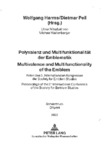Mostrar o rexistro simple do ítem
Neostoic Virtues in the Empresas políticas of Saavedra Fajardo. The Influence of Justus Lipsius
| dc.contributor.author | López Poza, Sagrario | |
| dc.date.accessioned | 2014-05-30T07:43:28Z | |
| dc.date.available | 2014-05-30T07:43:28Z | |
| dc.date.issued | 2002 | |
| dc.identifier.citation | López Poza, Sagrario, “Neostoic Virtues in the Empresas políticas of Saavedra Fajardo. The Influence of Justus Lipsius”, en Polyvalenz und Multifunktionalität der Emblematik. Multivalence and Multifunctionality of the Emblem. Akten des 5, Internationalen Kongresses der Society for Emblem Studies. Proceedings of the 5th International Emblem Conference of the Society for Emblem Studies. Wolfgang Harms / Dietmar Peil (Hrsg.) Unter Mitarbeit von Michael Waltemberger. Frankfurt am Main, Peter Lang, 2002. 2 vols. Vol. II, págs. 691-707. | es_ES |
| dc.identifier.isbn | 9783631361375 | |
| dc.identifier.uri | http://hdl.handle.net/2183/12191 | |
| dc.description.abstract | [Abstract] The influence of the Belgian humanist Justo Lipsio (Lipsius) on Diego de Saavedra Fajardo´s "Idea de un príncipe político-christiano representada en cien empresas " (Idea of a political-christian prince represented in one hundred impresas) (Munich, 1640) has not been studied until now, but we are in a position to affirm that Saavedra shares the philological and philosophical interests of the master of the european critical humanism, and that two works by Lipsio (De constantia and Politicorum sive civilis doctrina libri sex) exerted noteworthy influence on the composition of the political impresas. We seek to analyse some of the most praised virtues by the Belgian author (constantia, patientia, firmitas...) and the treatment Saavedra gives to them, manifesting the moral lesson through the canons of the Emblematics in this treatise which he writes for prince Baltasar Carlos´ education. Through the images and his statement, Saavedra tries to transmit to the king-to-be the principles of a secular and autonomous moral characteristic of the neostoicism, whose political and social influence had been quite important in the Europe of the time. | es_ES |
| dc.description.abstract | [Resumen] Virtudes neoestoicas en las Empresas políticas de Saavedra Fajardo La influencia del humanista belga Justo Lipsio (Lipsius) en la obra de Diego de Saavedra Fajardo Idea de un príncipe político-christiano representada en cien empresas (Munich, 1640) no ha sido estudiada hasta el momento, pero estamos en condiciones de afirmar que Saavedra comparte los intereses filológicos y filosóficos del maestro del humanismo crítico europeo, y que dos obras de Lipsio (De constantia y Politicorum sive civilis doctrina libri sex) ejercieron notable influencia en la composición de las Empresas políticas. Pretendemos analizar algunas de las virtudes más ensalzadas por el autor belga (constantia, patientia, firmitas...) y el tratamiento que las da Saavedra manifestando la lección moral a través de los cánones de la Emblemática en este tratado que escribe para la formación del príncipe Baltasar Carlos. A través de las imágenes y su declaración, Saavedra pretende transmitir al futuro rey los principios de una moral secular y autónoma propia del Neoestoicismo, cuya influencia política y social había sido considerable en la Europa del momento. | es_ES |
| dc.description.abstract | ZUSAMMENFASSUNG: Neostoische Tugende in den politischen "empresas" von Saavedra Fajardo. Der Einfluss des belgischen humanisten Justo Lipsio (Lipsius) auf das Werk von Diego de Saavedra Fajardo "Idea de un Príncipe político-christiano representada en cien empresas" ("Idee eines christlich-politischen Prinzen, der in hundert "empresas" repräsentiert ist") (Munich, 1640) wurde bisher nicht studiert, aber wir sind in der Lage zu behaupten, dass Saavedra die philologischen und philosophischen Interessen des Meisters des europäischen kritischen Humanismus teilt und, dass zwei Werke von Lipsio (De constantia und Politicorum sive civilis doctrina libri sex) bemerkenwert Einfluss auf die Komposition der politischen "Empresas" usüben. Zum einen versuchen wir einige von dem belgischen Author meist gelobten Tugenden zu analysieren (constantia, patientia, firmitas...), zum anderen auch die Behandlung die Saavedra Ihnen gibt, indem er die moralische Lektion mit Hilfe der Kanonen der "Emblemática" in dieser Abhandlung, die er für die Bildung des Prinzen Baltasar Carlos schreibt, manifestiert. Durch die Bilder und seine Deklaration versucht Saavedra dem künftigen König die Grundsätze einer für den Neostoizismus typischen weltlichen und autonomen Moral, deren politischer und sozialer Einfluss in dem Europa dieser Zeit beträchtliche gewesen war, zu übergeben. | es_ES |
| dc.language.iso | eng | es_ES |
| dc.publisher | Peter Lang | es_ES |
| dc.rights | Reconocimiento-NoComercial-SinObraDerivada 4.0 Internacional | |
| dc.rights.uri | http://creativecommons.org/licenses/by-nc-nd/4.0/ | |
| dc.subject | Emblemática | es_ES |
| dc.subject | Literatura española 1500-1700 (Período clásico) | es_ES |
| dc.subject | Saavedra Fajardo, Diego de | es_ES |
| dc.subject | Lipsius, Justus | es_ES |
| dc.subject | Neoestoicismo | es_ES |
| dc.subject | Virtudes | es_ES |
| dc.title | Neostoic Virtues in the Empresas políticas of Saavedra Fajardo. The Influence of Justus Lipsius | es_ES |
| dc.type | info:eu-repo/semantics/bookPart | es_ES |
| dc.rights.access | info:eu-repo/semantics/openAccess | es_ES |






